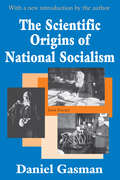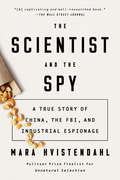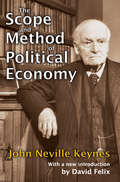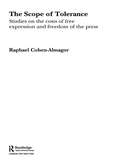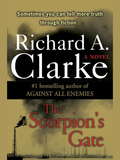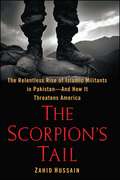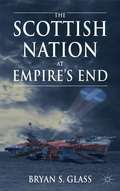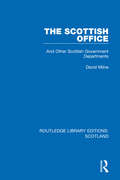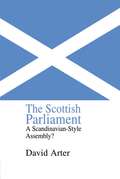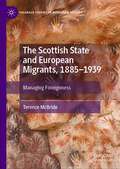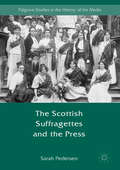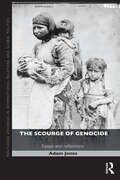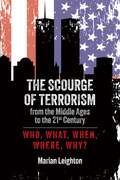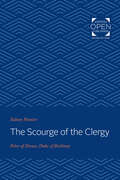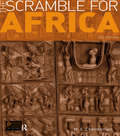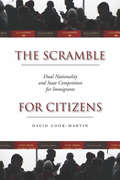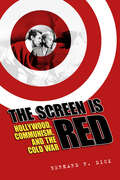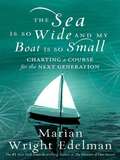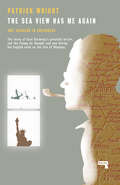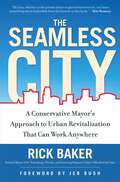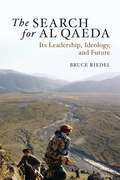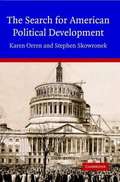- Table View
- List View
The Scientific Origins of National Socialism
by Daniel GasmanMany studies of the origins of National Socialism claim that the vo;lkisch and proto-Nazi movement arose largely as a reaction to the materialistic ideas of nineteenth-century science and especially to the naturalistic philosophy of Ernst Haeckel and the German Monist League. Using hitherto unexplored material, Daniel Gasman calls this generalization into question. Arguing that the importance of science has been relatively neglected in accounts of the intellectual origins of Nazism, he attempts to show that Haeckel's "scientific" Darwinism, and his movement, the German Monist League, were proto-Nazi in character.Contrary to popular belief, Haeckel's type of social Darwinism actually played a critical role in the formation of National Socialist ideology. In his new introduction, Gasman notes that recent research goes far to confirm Haeckel's role as an ideological progenitor of fascist ideology. This is true not only for Germany, but also for the birth of fascist thought in Italy and France. In general, Gasman claims, the history of science plainly reveals how Haeckel's social Darwinism nourished the roots of fascism no less than avant-garde modernism.When The Scientific Origins of National Socialism initially appeared, the Times Literary Supplement called it a "very well-argued thesis... that is completely successful... and leaves the reader to extract his own moral lessons." Medical History, in its review of The Scientific Origins of National Socialism, said, "His book is essential for understanding modern Germany. It has a general message derived from the events in Germany, where scientific data were permitted to take on a mystical signficiance... with ghastly consequences." Bruce Chatwin, in the New York Review of Books, called the book "brilliant." Now available in paperback, with a new introduction by the author, this seminal work will be of interest to intellectual historians, as well as th
The Scientist and the Spy: A True Story of China, the FBI, and Industrial Espionage
by Mara HvistendahlA riveting true story of industrial espionage in which a Chinese-born scientist is pursued by the U.S. government for trying to steal trade secrets, by a finalist for the Pulitzer Prize in nonfiction. In September 2011, sheriff&’s deputies in Iowa encountered three ethnic Chinese men near a field where a farmer was growing corn seed under contract with Monsanto. What began as a simple trespassing inquiry mushroomed into a two-year FBI operation in which investigators bugged the men&’s rental cars, used a warrant intended for foreign terrorists and spies, and flew surveillance planes over corn country—all in the name of protecting trade secrets of corporate giants Monsanto and DuPont Pioneer. In The Scientist and the Spy, Hvistendahl gives a gripping account of this unusually far-reaching investigation, which pitted a veteran FBI special agent against Florida resident Robert Mo, who after his academic career foundered took a questionable job with the Chinese agricultural company DBN—and became a pawn in a global rivalry.Industrial espionage by Chinese companies lies beneath the United States&’ recent trade war with China, and it is one of the top counterintelligence targets of the FBI. But a decade of efforts to stem the problem have been largely ineffective. Through previously unreleased FBI files and her reporting from across the United States and China, Hvistendahl describes a long history of shoddy counterintelligence on China, much of it tinged with racism, and questions the role that corporate influence plays in trade secrets theft cases brought by the U.S. government. The Scientist and the Spy is both an important exploration of the issues at stake and a compelling, involving read.
The Scope and Method of Political Economy
by John Neville KeynesThe elder Keynes argues that almost every problem connected with the scope and method of political economy has given rise to conflict of opinion. The resulting controversies have sometimes been bitter. Those readers, who already have any acquaintance with the literature of economic method should be prepared to find that several of the chapters are controversial in character. At the same time, Keynes avoids the tone of a partisan and represents both sides of the argument without prejudice.While making no attempt to bring about a complete reconciliation between opposing views, Keynes shows the nature of the opposition between them has sometimes been misunderstood, and its extent consequently exaggerated. Since the scope and method of a science can never be satisfactorily discussed at the commencement of its study, some knowledge of political economy in its general outlines is assumed.The nature of the topics discussed in this classic is indicated in the introductory chapter. The abstract discussion of methods is one to which students of economics must necessarily give attention in the course of their reading, and its indirect bearing on the solution of practical economic questions is very close in contemporary importance in today's society.
The Scope of Tolerance: Studies on the Costs of Free Expression and Freedom of the Press (Extremism and Democracy #Vol. 7)
by Raphael Cohen-AlmagorOne of the dangers in any political system is that the principles that underlie and characterize it may, through their application, bring about its destruction. Liberal democracy is no exception. Moreover, because democracy is relatively a young phenomenon, it lacks experience in dealing with pitfalls involved in the working of the system - the ‘catch’ of democracy. This is an interdisciplinary study concerned with the limits of tolerance, this ‘democratic catch’, and the costs of freedom of expression. Rights are costly, and someone must pay for them. We can and should ask about the justification for bearing the costs, weighing them against the harms inflicted upon society as a result of a wide scope of tolerance. While recognizing that we have the need to express ourselves, we should also inquire about the justifications for tolerating the damaging speech and whether these are weighty enough. This book combines theory and practice, examining issues of contention from philosophical, legal and media perspectives and covers such issues as: media invasion into one’s privacy offensive speech incitement hate speech holocaust denial media coverage of terrorism. This book is essential reading for anyone who has research interests in political theory, extremism, and free speech.
The Scorpion's Gate
by Richard A. ClarkeBiography I started writing books after a thirty year career in government writing bureaucratic papers. It was quite a shift. Cyber War is my fifth book and my third non-fiction. People often ask which genre do you prefer to write, fiction or non-fiction? They are both a challenge and both are exciting to attempt. Fiction may be the greater challenge, because of the need for imagination, characterization, dialogue, and plot twists.
The Scorpion's Tail
by Zahid HussainThe war in Afghanistan has raged on longer than any war in U.S. history, and far from suppressing the insurgency being waged by radical Islamic militants, it has led to stronger alliances among al Qaeda, the Taliban, and a host of once-autonomous militant groups and has inspired a flood of new recruits. In addition to reclaiming control of substantial territory in Afghanistan, the militants have now taken the fight deep within Pakistan--threatening to totally destabilize that nuclear-armed state--and are launching attacks on the U.S. homeland. Why has the insurgency been so irrepressible? Is this a war that can be won? Can we expect a wave of attacks within the United States more sophisticated than the attempted bombing in Times Square? Nothing can be understood about the prospects for the war and the threat to the U.S. homeland without understanding how Pakistan has become the epicenter of the insurgency and why the rise of militant groups there has escalated out of control despite major offensives by the Pakistani military and an intensive secret U.S. Predator drone war against them. Based on extensive reporting inside Pakistan's dangerous lawless regions and exclusive interviews with militant leaders as well as high-level military and intelligence sources, Zahid Hussain, one of the most respected reporters working out of Pakistan, chronicles how and why the Islamic extremist groups based in Pakistan's remote tribal territories have greatly increased their power since the start of the war and unleashed a reign of terror on U.S. forces in Afghanistan and on both the military and civilian population within Pakistan. He is the first to reveal how a loose constellation of tribal groups has now come together to form a distinctive Pakistani Taliban, working closely with al Qaeda and the Afghani Taliban to launch increasingly sophisticated and deadly attacks on both sides of the Af-Pak border. He discloses how they draw support and a steady flood of recruits from deeply entrenched support networks in major Pakistani cities, and how they have recruited would-be U.S. attackers, including Faisal Shahzad and Adnan Shukrijumah, accused of plotting to bomb the New York City subway. He is also the first to chronicle in detail the still unacknowledged U.S. war carried out in Pakistan by remote Predator drones, and, reporting from the scenes of a number of drone missile strikes and interviewing a number of attempted suicide bombers, he reveals the shocking extent of anti-Americanism the strikes have stoked in Pakistan, across the range of the population, due to civilian deaths, driving a new breed of highly educated, professional, and middle-class Pakistanis into the militant groups. His gripping and revelatory account is an urgent wake-up call about the blowback effects of the U.S. war in Afghanistan and the drone campaign in Pakistan, about how volatile the situation in the Af-Pak region has become, and about the deeply troubling limitations of the current military strategy in ever gaining decisive ground against the insurgents.
The Scottish Enlightenment: Essays In Reinterpretation (Rochester Studies In Philosophy Ser. #1)
by Alexander BroadieThis authoritative anthology covers the many contributions to science, philosophy and economics made by the great minds of 18th century Scotland. Through the eighteenth and into the nineteenth centuries, Scotland saw an explosion of intellectual activity in the realms of philosophy, law, economics, politics, linguistics and the physical sciences. Great thinkers such as Adam Smith, David Hume, Adam Ferguson, Thomas Reid, James Hutton, and many others formulated many of the ideas that would become foundational to modernity. This anthology collects some of the most significant works by Scottish Enlightenment thinkers as well as lesser-known writings that have not been reprinted for centuries. Arranged thematically, it includes sections on Human Nature, Ethics, Aesthetics, Religion, Economics, Social Theory and Politics, Law, Historiography, Language and Science. Scottish philosopher and intellectual historian Alexander Broadie sheds light on the significance of these writings through his masterful introduction as well as commentary throughout.&“A major contribution to our literature and intellectual resources and I do not think it could be better done . . . For many people this book will become a companion for years or even a lifetime.&” —Scotsman, UK
The Scottish Nation At Empire’s End
by Bryan S. GlassThe rise and fall of the British Empire profoundly shaped the history of modern Scotland and the identity of its people. By examining the opinions of Scots towards the empire from numerous professional and personal backgrounds, Scotland emerges as a nation inextricably linked to the British Empire.
The Scottish Office: And Other Scottish Government Departments (Routledge Library Editions: Scotland #19)
by David MilneOriginally published in 1957, this book gives a comprehensive account of the scope and variety of the work previously performed by Scottish Government departments in Whitehall during the second half of the 20th Century. The then Secretary of State for Scotland’s role was unusually diverse – he or she was the equivalent to a number of English ministers. The book examines this complex role and then analyses the work and organisation of 4 main departments: Agriculture, Education, Health and Home. The approach is a broad one, with an explanation given of how and why Scottish arrangements and practices differ from those south of the border.
The Scottish Parliament: A Scandinavian-Style Assembly?
by David ArterThis book is unique in analysing the new Scottish Parliament from a systematically comparative perspective. Its basic premise is that since devolution in 1999 Scotland can be considered a Scandinavian-style democracy with several features of a Scandinavian-style parliament. The basic research question, therefore, is: 'Has the Scottish Parliament in its first four-year term manifested a Scandinavian-style politics in the sense that there has been a high incidence of inter-party negotiation within Parliament?'The architects of the Scottish Parliament saw the committees as the motor of a 'new politics' and gave them extensive powers. Outside Austria, only the Swedish and Icelandic committees have comparable powers. Accordingly, the study sets out to describe and analyse the workings of the committees in the Scottish, Swedish and Icelandic Parliaments. The concluding chapter also discusses the operation of the Danish, Finnish and Norwegian committees.
The Scottish State and European Migrants, 1885–1939: Managing Foreignness (Palgrave Studies in Migration History)
by Terence McBrideThis book examines the efforts of the government in Scotland to manage the increase of migrants travelling to Britain at the end of the nineteenth century. Focussing on the period between 1885 and 1939, the book explores how the Scottish machinery of government handled the administration of ‘foreigners.’ The author uses a comparative, thematic approach to analyse migrant experiences, identities, and relationships with state institutions. Drawing from state records held by the National Records of Scotland in Edinburgh, the book argues that Scottish officials in semi-autonomous boards began to recognise, describe and enumerate the presence of the ‘foreigner’ in the early twentieth century, framing their handling of foreignness in accordance with the Aliens Act of 1905. The author goes on to explain that institutions operating in Scotland developed a distinctly Scottish approach to alien matters, which continued up until the Second Word War. Therefore, an increasing number of importantdecisions affecting migrants were taken by a distinctly Scottish machinery of government, impacting on how Scottish officials understood foreignness, and how those identified as foreigners understood their identity in relation to Scottishness. Contributing significantly to current heated debates on migration and identity amongst researchers and the general public in Europe and beyond, this book provides essential insights into the ways in which a ‘sub-state’ began to develop practices, processes and attitudes towards migration which were not always in line with that of the central government.
The Scottish Suffragettes and the Press
by Sarah PedersenThis book approaches the Scottish women's suffrage campaign from the point of view of the popular press. It investigates how the press engaged with the women's suffrage movement; how suffragettes were portrayed in newspapers; and how different groups attempted to use the press to get their message into the public sphere. Scottish suffrage campaigners acknowledged the need for press coverage from the start of the campaign in the 1870s, but the arrival of the militant suffragettes completely transformed newspaper coverage. The Scottish newspapers were particularly interested in suffragette activities during local by-elections and their hounding of local anti-suffrage MPs such as Herbert Asquith. The book also investigates the impact of the First World War on the movement.
The Scourge of Genocide: Essays and Reflections (Routledge Advances in International Relations and Global Politics)
by Adam JonesThe Scourge of Genocide collects essays, reviews, and reportage on the subjects of genocide and crimes against humanity by Adam Jones, recently selected as one of "Fifty Key Thinkers on the Holocaust and Genocide." The volume includes a number of previously-unpublished essays, and explores a range of debates and approaches in comparative genocide studies, such as: Genocide, pedagogy, and visual representation. Gender and "gendercide." The role of media and communications in genocide. The historiography of genocide studies. "Subaltern genocide," or genocides by the oppressed. Strategies of genocide prevention and intervention. Covering a broad spectrum of theoretical perspectives, as well as case studies from the former Yugoslavia, Rwanda, Guatemala, Afghanistan, Iraq, and Israel/Palestine, this book is essential reading for all scholars and students of genocide studies, political violence, and international relations.
The Scourge of Terrorism from the Middle Ages to the Twenty-First Century: Who, What, When, Where, Why?
by Marian P. LeightonThis is the first book covering the entire timeline as well as the actors and factors driving international terrorism in each phase of its development. It provides an historical journey across the terrorist landscape and offers insights and analyses of th
The Scourge of the Clergy: Peter of Dreux, Duke of Brittany
by Sidney PainterOriginally published in 1937. Painter's Scourge of the Clergy is a biography of Peter of Dreux, who was the Count of Dreux from 1298 to 1345. This book engages in a conversation with specialists of medieval France and Brittany, given that Peter's career gives historians insight into the quarrels between church and state, the crusades of St. Louis, the struggles between French kings and vassals, and the rivalry of the Capetian and Plantagenet monarchies.
The Scramble for Africa (Seminar Studies)
by M. E. ChamberlainIn 1870 barely one tenth of Africa was under European control. By 1914 only about one tenth – Abyssinia (Ethiopia) and Liberia – was not. This book offers a clear and concise account of the ‘scramble’ or ‘race’ for Africa, the period of around 20 years during which European powers carved up the continent with little or no consultation of its inhabitants. In her classic overview, M.E. Chamberlain: Contrasts the Victorian image of Africa with what we now know of African civilisation and history Examines in detail case histories from Egypt to Zimbabwe Argues that the history and background of Africa are as important as European politics and diplomacy in understanding the 'scramble' Considers the historiography of the topic, taking into account Marxist and anti-Marxist, financial, economic, political and strategic theories of European imperialism This indispensible introduction, now in a fully updated third edition, provides the most accessible survey of the ‘scramble for Africa’ currently available. The new edition includes primary source material unpublished elsewhere, new illustrations and additional pedagogical features. It is the perfect starting point for any study of this period in African history.
The Scramble for Africa (Seminar Studies)
by M. E. ChamberlainIn 1870 barely one tenth of Africa was under European control. By 1914 only about one tenth – Abyssinia (Ethiopia) and Liberia – was not. This book offers a clear and concise account of the ‘scramble’ or ‘race’ for Africa, the period of around 20 years during which European powers carved up the continent with little or no consultation of its inhabitants.In her classic overview, M.E. Chamberlain: Contrasts the Victorian image of Africa with what we now know of African civilisation and history Examines in detail case histories from Egypt to Zimbabwe Argues that the history and background of Africa are as important as European politics and diplomacy in understanding the 'scramble' Considers the historiography of the topic, taking into account Marxist and anti-Marxist, financial, economic, political and strategic theories of European imperialism This indispensible introduction, now in a fully updated third edition, provides the most accessible survey of the ‘scramble for Africa’ currently available. The new edition includes primary source material unpublished elsewhere, new illustrations and additional pedagogical features. It is the perfect starting point for any study of this period in African history.
The Scramble for Citizens: Dual Nationality and State Competition for Immigrants
by David Cook-MartinIt is commonly assumed that there is an enduring link between individuals and their countries of citizenship. Plural citizenship is therefore viewed with skepticism, if not outright suspicion. But the effects of widespread global migration belie common assumptions, and the connection between individuals and the countries in which they live cannot always be so easily mapped. InThe Scramble for Citizens, David Cook-Martín analyzes immigration and nationality laws in Argentina, Italy, and Spain since the mid 19th century to reveal the contextual dynamics that have shaped the quality of legal and affective bonds between nation-states and citizens. He shows how the recent erosion of rights and privileges in Argentina has motivated individuals to seek nationality in ancestral homelands, thinking two nationalities would be more valuable than one. This book details the legal and administrative mechanisms at work, describes the patterns of law and practice, and explores the implications for how we understand the very meaning of citizenship
The Screen Is Red: Hollywood, Communism, and the Cold War
by Bernard F. DickThe Screen Is Red portrays Hollywood's ambivalence toward the former Soviet Union before, during, and after the Cold War. In the 1930s, communism combated its alter ego, fascism, yet both threatened to undermine the capitalist system, the movie industry's foundational core value. Hollywood portrayed fascism as the greater threat and communism as an aberration embraced by young idealists unaware of its dark side. In Ninotchka, all a female commissar needs is a trip to Paris to convert her to capitalism and the luxuries it can offer. The scenario changed when Nazi Germany invaded the Soviet Union in 1941, making Russia a short-lived ally. The Soviets were quickly glorified in such films as Song of Russia, The North Star, Mission to Moscow, Days of Glory, and Counter-Attack. But once the Iron Curtain fell on Eastern Europe, the scenario changed again. America was now swarming with Soviet agents attempting to steal some crucial piece of microfilm. On screen, the atomic detonations in the Southwest produced mutations in ants, locusts, and spiders, and revived long-dead monsters from their watery tombs. The movies did not blame the atom bomb specifically but showed what horrors might result in addition to the iconic mushroom cloud. Through the lens of Hollywood, a nuclear war might leave a handful of survivors (Five), none (On the Beach, Dr. Strangelove), or cities in ruins (Fail-Safe). Today the threat is no longer the Soviet Union, but international terrorism. Author Bernard F. Dick argues, however, that the Soviet Union has not lost its appeal, as evident from the popular and critically acclaimed television series The Americans. More than eighty years later, the screen is still red.
The Sea Is So Wide and My Boat Is So Small: Charting a Course for the Next Generation
by Marian Wright EdelmanIn America today, the gap between the rich and the poor is the greatest ever recorded--larger than any other industrialized nation. It has become far too easy to ignore the hardships of millions of children plagued by poverty, poor health, illiteracy, violence, adult hypocrisy, and injustice. As founder and president of the Children's Defense Fund, Marian Wright Edelman knows all too well the suffering of so many of our nation's children, who live every day with adversity most of us can barely imagine. In The Sea Is So Wide and My Boat Is So Small, Edelman asks difficult questions about what we truly value, and looks hard at what we can--and must--do to build a nation fit for all children. With the passion and conviction that have made her our leading child advocate, she calls us all to stand up for the future of America. What have we done and what have we left undone? What lessons can we learn from our past and our present to realize a just and peaceful national and world vision for our children and grandchildren? Marian Wright Edelman challenges all of us--our leaders, our teachers, the faith community, parents, grandparents, and future generations--to end the epidemic physical and spiritual poverty afflicting millions of our children. We can leave our children with a better, safer, and fairer world if we care enough. And we can--and must--do it now.
The Sea View Has Me Again: Uwe Johnson in Sheerness
by Patrick WrightThe story of Uwe Johnson, one of Germany's greatest and most-influential post-war writers, and how he came to live and work in Sheerness, Kent in the 1970s.Towards the end of 1974, a stranger arrived in the small town of Sheerness on the Isle of Sheppey in Kent. He could often be found sitting at the bar in the Napier Tavern, drinking lager and smoking Gauloises while flicking through the pages of the Kent Evening Post. "Charles" was the name he offered to his new acquaintances. But this unexpected immigrant was actually Uwe Johnson, originally from the Baltic province of Mecklenburg in the GDR, and already famous as the leading author of a divided Germany. What caused him to abandon West Berlin and spend the last nine years of his life in Sheerness, where he eventually completed his great New York novel Anniversaries in a house overlooking the outer reaches of the Thames Estuary? And what did he mean by detecting a "moral utopia" in a town that others, including his concerned friends, saw only as a busted slum on an island abandoned to "deindustrialisation" and a stranded Liberty ship full of unexploded bombs? Patrick Wright, who himself abandoned north Kent for Canada a few months before Johnson arrived, returns to the "island that is all the world" to uncover the story of the East German author's English decade, and to understand why his closely observed Kentish writings continue to speak with such clairvoyance in the age of Brexit. Guided in his encounters and researches by clues left by Johnson in his own "island stories", the book is set in the 1970s, when North Sea oil and joining the European Economic Community seemed the last hope for bankrupt Britain. It opens out to provide an alternative version of modern British history: a history for the present, told through the rich and haunted landscapes of an often spurned downriver mudbank, with a brilliant German answer to Robinson Crusoe as its primary witness.
The Seamless City: A Conservative Mayor's Approach to Urban Revitalization that Can Work Anywhere
by Jeb Bush Rick BakerHOW DO WE KEEP AMERICA GREAT?Rick Baker, former mayor of St. Petersburg, Florida, provides a compelling--and challenging--answer: by making American cities great. And great cities are built first of all through strong leadership.During his two terms in office, Rick Baker worked toward a clear, uncompromising goal: to make St. Petersburg the best city in America. He led a downtown renaissance, rebuilt the most economically depressed area of the city, attracted businesses, worked to reduce violent crime, and made public schools a city priority--all with measurable results. The Seamless City offers practical advice, based on his nine years of experience in City Hall, to show how every mayor and city council can make their city dramatically better.In The Seamless City you'll step behind the scenes of city government to learn:How maintaining basic amenities, like running water, requires constant vigilance--and sometimes tough decisions on the part of city leadershipWhy a vibrant downtown is essential to attract businesses and create jobsWhy the most effective leadership is servant leadershipHow to find and implement the most effective solutions to a city's most challenging problemsWhy city government needs to regard the city as a seamless whole, with no section under-served or overlooked
The Search for Al Qaeda
by Bruce RiedelAl Qaeda is the most dangerous terrorist movement in history. Yet most people in the West know very little about it, or their view is clouded by misperceptions and half truths. This widely acclaimed book fills this gap with a comprehensive analysis of al Qaeda-the origins, leadership, ideology, and strategy of the terrorist network that brought down the Twin Towers and continues to threaten us today.Bruce Riedel draws on decades of insider experience-he was actually in the White House during the September 11 attacks-in profiling the four most important figures in the al Qaeda movement: Usama bin Laden, ideologue and spokesman Ayman Zawahiri, former leader of al Qaeda in Iraq Abu Musaib al Zarqawi (killed in 2006), and Mullah Omar, its Taliban host. These profiles provide the base from which Riedel delivers a much clearer understanding of al Qaeda and its goals, as well as what must be done to counter and defeat this most dangerous menace.
The Search for American Political Development
by Karen Orren Stephen SkowronekThis book provides a justification for studying politics historically, not only for what it reveals about the roots of political affairs at the present time but what it teaches about politics as an ongoing activity. The authors survey past and current scholarship, attempting to outline a course of study for the future.
The Search for Efficiency in the Adjustment Process: Spain in the 1980s
by Augusto Lopez-ClarosA report from the International Monetary Fund.
